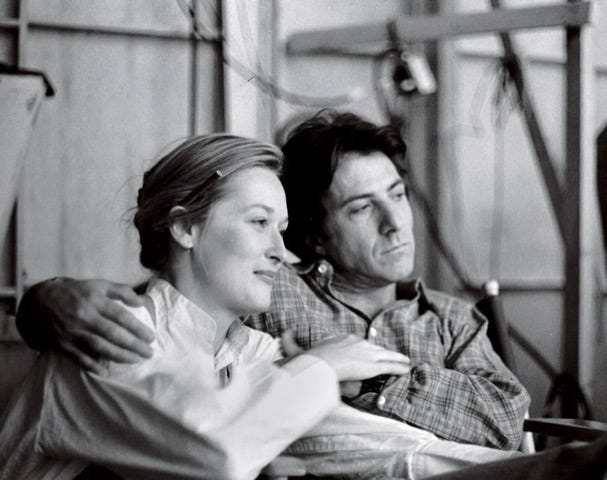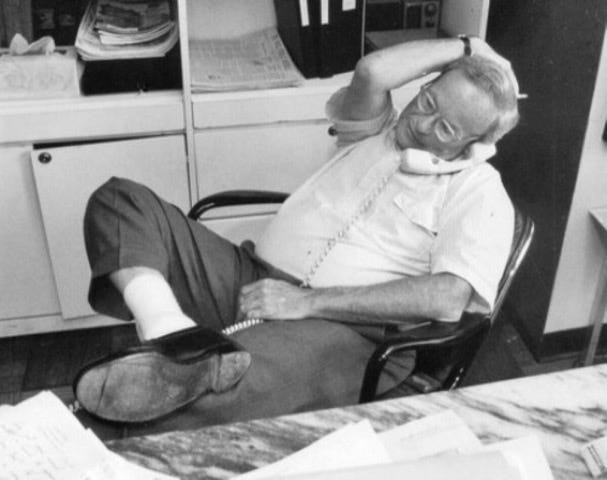Shortly after I moved to New York I managed to get a temp job at a big talent agency called International Creative Management.
My job was to man the phones on the 16th floor when the regular receptionist went to the bathroom or took her lunch break. One day I got on to the elevator at the end of the day and a short old man was standing to one side. He had a Kleenex hanging out of his mouth and looked very distracted. But he turned to me and we struck up a conversation as we traveled the 16 flights down to the lobby. He told me to come see him on the 18th floor the next morning and that his name was Sam.
I went to see the head of HR the next day who was a Polish guy named Andrew. My interview with him had been a stunner. He asked one question. And bear in mind this was to be the relief receptionist on the 16th floor: “How would the world be different if the First World War had not been fought?”
We had chatted for an hour on the topic and I remember wondering how on earth this incredibly smart but very unique man had gotten the job. I would discover that the answer to this, as with everything in that building and most of the good movies you love from a certain wondrous period, led to the office of the little old man who ate Kleenex.
When Andrew heard I had been summoned to see Sam he turned ashen. “What did you do?” Nothing I assured him and with a shake of his head he sent me off to the corner office on the 18th floor which housed Sam Cohn and his army of assistants.
It turned out that my chance encounter had been with one of the most legendary agents ever to work in Hollywood and it’s not by chance that you’ve never heard of him.
As far as he was concerned, press and accolades were for his clients. His sole job was to wrest as much money and control as possible from the Hollywood machine on behalf of the artists he represented.
To my knowledge, there has only ever been one piece of press about Sam, a profile in the New Yorker Magazine. In it, Jeffrey Katzenberg is quoted as saying something along the lines of “if you want to get a movie made in Hollywood you first have to be able to get Sam Cohn on the phone in New York”.
Bob Fosse, Woody Allen, Robert Altman, Robert Benton, Alan Pakula, Meryl Streep, Robin Williams, Paul Newman, E.L. Doctorow, Peter Maas, Liam Neeson, Susan Sarandon, Faye Dunaway, David Hare, Kander and Ebb, Comden and Green, Tim Robbins, Steve Tesich, Avery Corman, Jackie Gleason, Sigourney Weaver, Whoopi Goldberg, Mike Nichols, Arthur Miller, Meryl Streep.
Those are just the clients I can remember. But you get the idea and, if you don’t know a few of those names look them up and you’ll go “ohhhhh, that movie!”.
I walked in to the ante-chamber where two assistants sat. A fierce blonde looked me over and ushered me in to sit opposite Sam, across his big marble desk. He was on the phone with a Kleenex hanging out of his mouth. I can’t remember what he was talking about but midway through he looked at me and said “Go get me Maarten”.
I didn’t know it was spelled like that at the time and I was panic-stricken because who the hell was Martin? I walked out and stammered at his assistants and one of them grabbed a phone to summon Sam’s personal business affairs lawyer Maarten from down the hall. I was sent back in and duly sat there for half an hour while Sam and Maarten discussed the finer points of some deal. When he was done, Sam looked at me and politely introduced himself and asked if I’d like a job as his third assistant.
In the four years I worked in Sam’s office I rose from third to first assistant. That was really the fierce blonde’s title but she had risen above that rank and was more the Ring Mistress of the circus. Sam was demanding, smart, unforgiving. He was a tireless champion for his clients and their art. We routinely stayed at the office until late and not once in all the time I worked for him did Sam go home from the office. His evenings were filled with classical music, the ballet, theatre, movies. Never the premieres of his clients’ work – always the previews (what you call a Broadway show before it opens), the screenings of rough cuts, or just the chance to share some music with the artists he so loved. He knew the real work happened in the stages of conception. Lunch was always at the Russian Tea Room – a fact immortalized by Sydney Pollack in the movie “Tootsie” when he takes his client Dustin Hoffman there for lunch. They shot it in the actual restaurant in Sam’s booth as an homage to Sam’s role in putting together the film “Kramer vs. Kramer”.
When Paul Newman was nominated for an Oscar for the Sam Mendes movie Road to Perdition, and John Kander and Fred Ebb were nominated for the film version of Chicago, I asked Sam why he wasn’t going to the ceremony. He told me to look up the nominations for 1980 and said he didn’t go then so why would he go now? I checked and Sam’s clients were nominated for 22 Oscars that year, including 3 of the 5 Best Picture nominees.
Heaven help you if you tried to use an abbreviation or acronym while talking with him – Sam loved language and was a tyrant about its misuse. His call sheet (the list of phone calls to return) was formidable and it was my job as the first to make sure we returned the important calls. This was generally a who’s who of Hollywood power players but also always included the writer, director or star of some tiny off-Broadway or regional play that Sam had fallen in love with and decided to help. It was my job to keep track of that. Every movie of note that was released was seen; the season of every important ballet company was attended; most of the plays on Broadway had his touch on them somewhere.
Sam probably hated this.
This was without doubt the most cultured person I have ever met. He drove me crazy at times; gave me an ulcer by the age of 27; he routinely called me at home on the weekends to report that page 37 was missing from a script he had to read which meant a cab ride to the office to retrieve it. He did not consider a script read until each word had been considered. I once had to stop him from strangling another assistant, routinely had to remind him of people’s names, and explain to him that the car he had just gotten in was not in fact his car but someone else’s. He never understood why the other person couldn’t just take his car.
Fosse’s movies; Altman’s movies; the suggestion to make Ripley a woman rather than a man and to put a certain young actress in the role; so many classic Broadway shows including Cabaret and Chicago; the plays of Arthur Miller, David Hare and John Guare; the writing careers of Steve Tesich, Avery Corman, Peter Maas. The screen careers of Meryl Streep, Sigourney Weaver, Dianne Wiest, Robin Williams, Liam Neeson, Susan Sarandon.
So many cultural milestones passed through or were created in that office. And that was the point.
Capitalism has an entertainment system but Sam would be damned if his clients were going to be answerable to bean counters or the idiots in Los Angeles (his disdain for that town was legendary).
And he’d also be damned if he didn’t make the best, most nuanced deal one could imagine.
My ulcer is long-since healed, but I still think twice before using an abbreviation in conversation. I marvel at the lack of commitment to culture that you find in most corners of this business, but I also love coming across a film or book or play that pushes us along whether we like it or not.
Not everyone can be as insistent as Sam could at the height of his powers about the necessity of culture and of being cultured, but human creativity will always sneak through. It is our jobs as producers to notice the ember and blow on it with all our might to see what kind of fire might be ignited.






